The first patient has received a dose of TNG260 in combination with pembrolizumab (Keytruda) as part of a Phase I/II clinical trial for advanced solid tumors (NCT05887492).
TNG260, an inhibitor of the CoREST-selective deacetylase, has shown promise in overcoming α-PD1 resistance caused by STK11 loss. The Phase I/II, open-label study aims to evaluate the safety, tolerability, pharmacokinetics, and efficacy of TNG260 as a single agent and in combination with an anti-PD-1 antibody (pembrolizumab) in patients with advanced solid tumors, including non–small cell lung cancer (NSCLC), endometrial cancer, pancreatic cancer, cervical cancer, breast cancer, and others. The study plans to enroll approximately 126 patients.
Patients will be assigned to one of four arms: the dose-escalation cohort for patients with STK11-mutant solid tumors, the dose-expansion cohort for those with STK11-mutant and KRAS-mutant NSCLC, the dose-expansion arm for patients with STK11-mutant and KRAS-wild-type NSCLC, and the dose-expansion arm for patients with STK11-mutant advanced or metastatic solid tumors.
“STK11 loss of function results in immune evasion within the tumor microenvironment and renders tumors resistant to various checkpoint inhibitors. This process makes treatment of cancers difficult, particularly those for which we rely on immunotherapy. TNG260 is a CoREST inhibitor which can re-sensitize tumors to checkpoint inhibitors. TNG260 in combination with PD-1 blockade in preclinical studies has demonstrated excellent antitumor activity, but also the development of memory responses which can prevent further cancer formation,”
– Salman R. Punekar, MD, a medical oncologist and assistant professor, Department of Medicine at NYU Grossman School of Medicine
In the Phase I portion, the primary objective is to determine the maximum-tolerated dose and recommended Phase II dose of TNG260. In Phase II, the primary endpoint will be the evaluation of antitumor activity, including objective response rate, duration of response, and progression-free survival.
The study will also assess secondary endpoints, such as antitumor evidence of TNG260 plus pembrolizumab, antineoplastic activity in Phase I, pharmacokinetics of TNG260, safety and tolerability, and changes in histone acetylation of pembrolizumab when administered with TNG260.
Eligible patients must be 18 years or older with an ECOG performance score of 0 or 1, measurable disease per RECIST v1.1, a STK11 mutation, confirmed disease by histology or cytology, and adequate organ and renal function. Female patients must have a negative pregnancy test to participate. Patients with known allergies, hypersensitivity, or intolerance to the investigational agent, as well as those with certain medical conditions, are excluded from the study.
Overall, this trial holds promise for advancing treatment options for patients with advanced solid tumors, particularly those with STK11 mutations, and evaluating the efficacy and safety of TNG260 in combination with pembrolizumab.





























